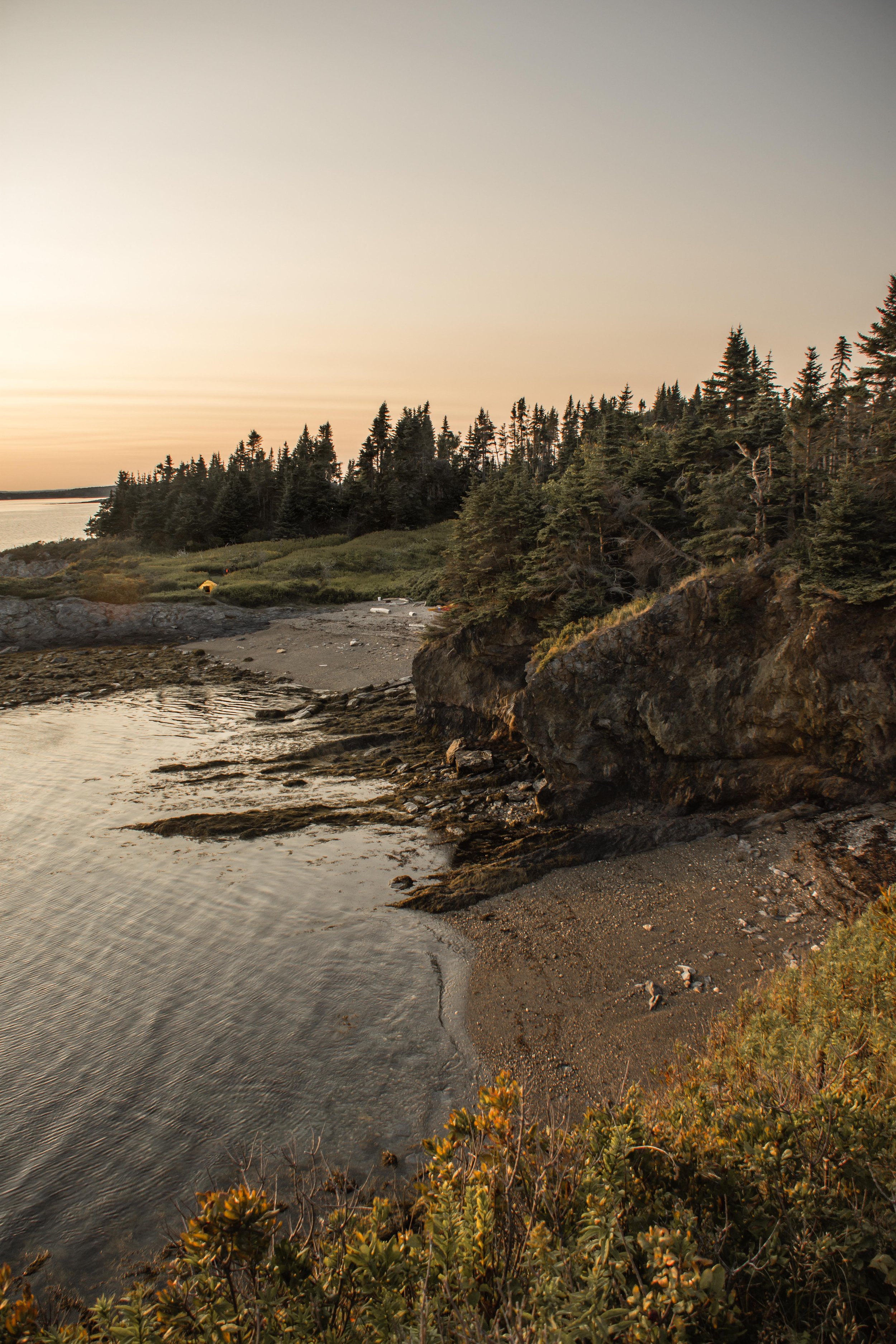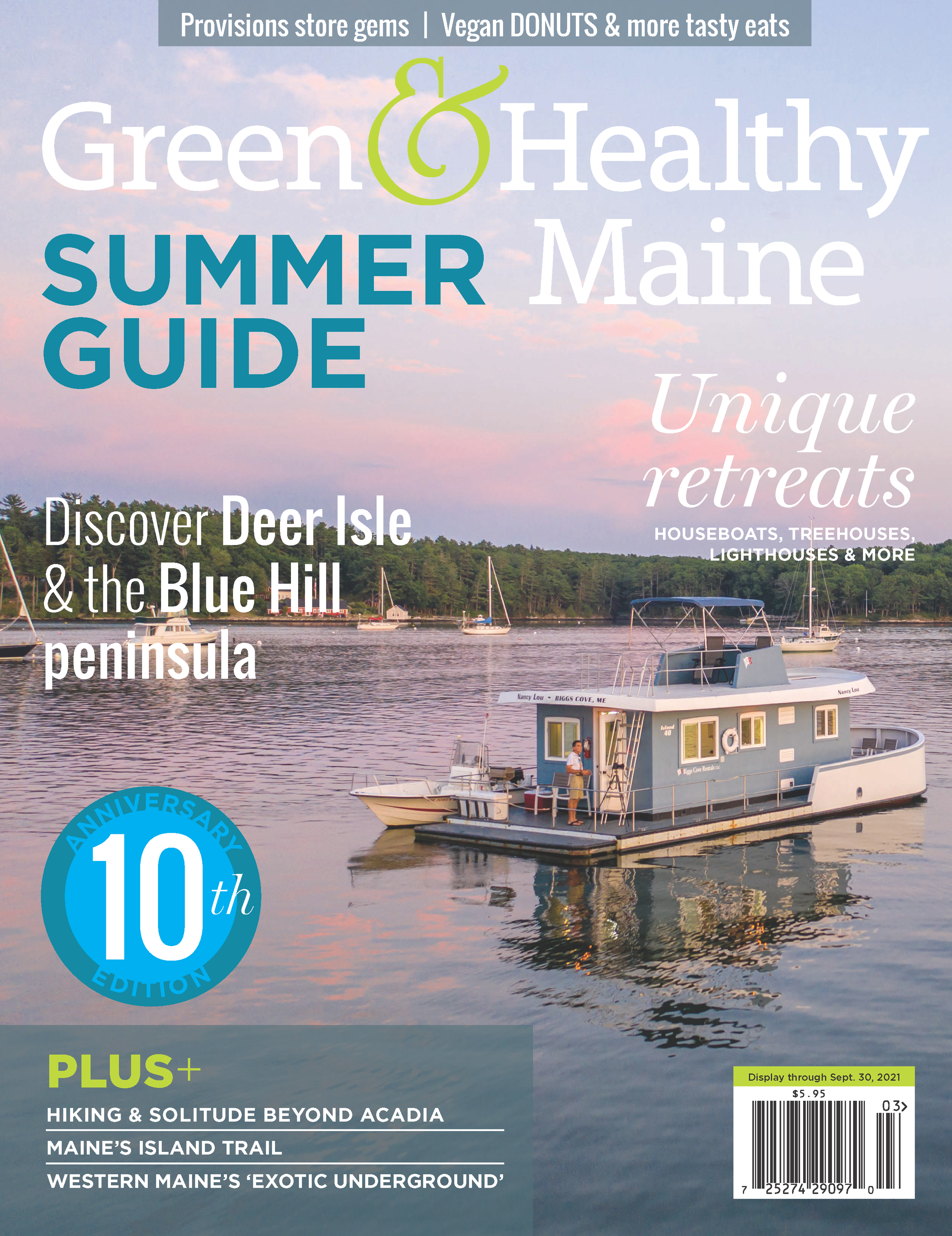Wild island adventures
Raspberry Island is uninhabited–and void of raspberries. PHOTO BY JORDI ST. JOHN.
By Amy Paradysz
Jewell Island on the outer edge of the Casco Bay Islands. PHOTO BY NIKKI COUINARD.
Back in the Rusticator Era of the 1890s, city dwellers from New York and Boston in search of clean, cool sea breezes bought wild islands off the coast of Maine, like Raspberry Island, at the entrance of Quahog Bay. “Within the family it’s been a place of retreat and for wild adventure in a Robinson Crusoe sort of way,” says Alicia Heyburn, co-owner of Raspberry through “luck and lineage” on her father’s side. “Six generations later, my teenagers are having life-changing experiences on those same two acres.”
Heyburn, executive director of Teens to Trails and co-leader of the Ladies Adventure Club, has dropped her two teenagers on Raspberry with a tent, a cookstove and food for an overnight of sibling bonding. More frequently, she kayaks from Cundy’s Harbor to Raspberry and just watches nature as nature intended it.
“It’s restorative,” she says, “and you don’t have to own these places to have them in your life, that’s why the Maine Island Trail Association is so great. We just feel good about sharing it. There are so many ways to define ownership; in this case it certainly doesn’t mean exclusive use.”
Heyburn is one of more than 100 generous landowners to have made a “handshake agreement” with the Maine Island Trail Association (MITA), opening their property to members with guidelines for use. On Raspberry, for example, camping is first come, first served for up to two tents or four people; fires are not allowed; and all human and pet waste needs to be carried out (that’s true for almost every island).
“A membership to MITA is like having a key to the coast of Maine, it opens up hundreds of opportunities for offshore adventure,” Heyburn says. “With their guidebook or app, you know where you can go. What’s it going go to be like? Can I have a fire? How many people can go? Is there anywhere I can pull my boat ashore?”
The MITA app, which can be downloaded for free, has a nautical chart outlining all the public islands. A digital membership at $25 a year unlocks the privately owned spots that are open to members.
MITA was established in 1989 by small boat owners who recognized Maine’s wild islands as the extraordinary recreational resource they are. MITA members have access to 241 sites—a mix of public and private islands—covering 375 miles from Kittery to the Canadian border.
“We don’t own any land,” says communications manager Madison Moran. “It’s all handshake agreements with island owners. There’s a relationship based on trust between the landowners and MITA members, that those who use the Trail will help care for it. We can’t do the big group cleanup days this year, so we’re putting out A Call to Oars and asking people to play a bigger role in maintaining the islands while they’re out there. Cared for by the people who use it—that’s how MITA was founded, and it’s how it still works.”
Siblings Aislyn and Sylvan St. John of West Bath explore Damariscove Island, owned by Boothbay Region Land Trust, which is about six nautical miles off the coast at the mouth of the Damariscotta River. PHOTO BY JORDI ST. JOHN.
Volunteers, like the St. John family who have adopted Merritt Island on New Meadows River between Bath and Brunswick, commit to looking after one of the islands. The St. Johns have an oyster farm about 50 feet offshore of Merritt Island, less than a mile from their home, and when Jordi St. John goes for a run during low tide, he picks up trash along the way.
“Getting out to a wild Maine island is perfect for social distancing,” he says.
Jordi and Katrina St. John explore the Midcoast and Casco Bay islands on a 21-foot motorboat with their eight-year-old daughter Aislyn and six-year-old son Sylvan. Aislyn’s favorite island is the one closest to home, the one she knows intimately. Merritt Island, which is owned by Bowdoin College, has two campsites, a beach at low tide, sea grass and—Aislyn’s favorite thing—a swing with a wooden board.
“The richest life is when life is the most simple,” Heyburn says. “Get back to basics. I’ve never had a better night than when camping on a wild Maine island.”
Islands newly added to the trail in 2020 include Wood Island and Eagle Point, both owned by the Town of Kittery, and Strawberry Island Preserve, owned by the Kennebunk Land Trust. Potato Island in Deer Isle, owned by the State of Maine, is back on the trail now that the Bald Eagle there is no longer nesting. Moran describes Potato as “a speck of an island that you can call home for the night.”
Potato Island is back on the trail now that there’s no longer a nesting bald eagle. PHOTO BY MARIA JENNESS.






